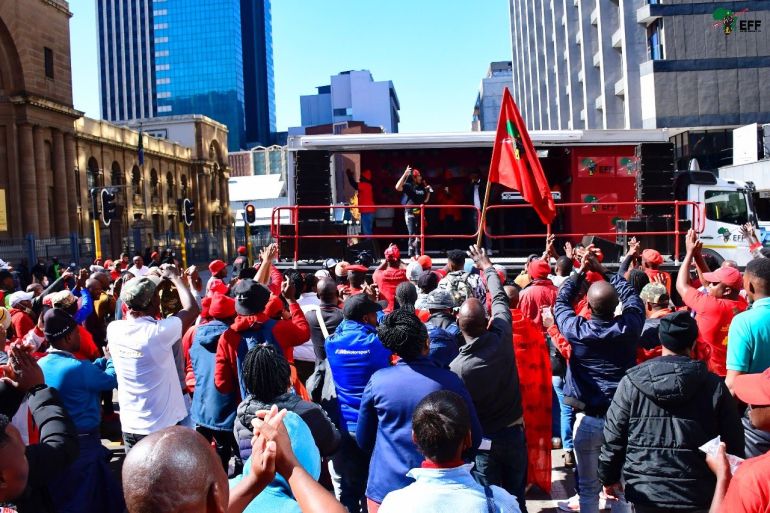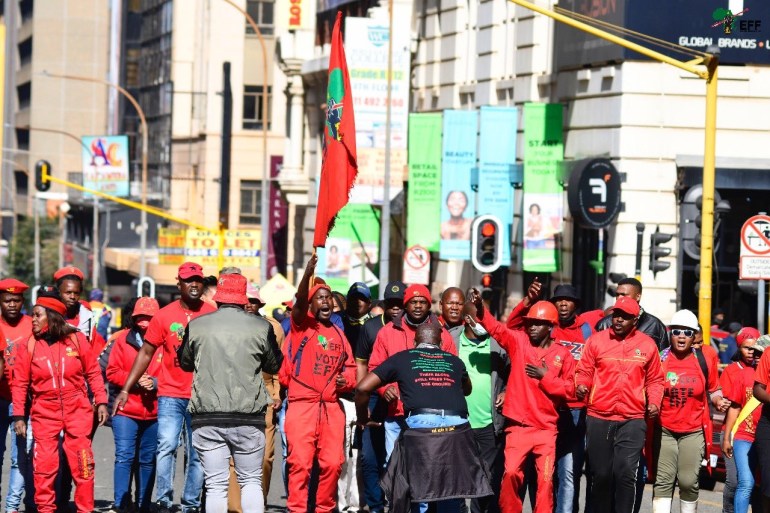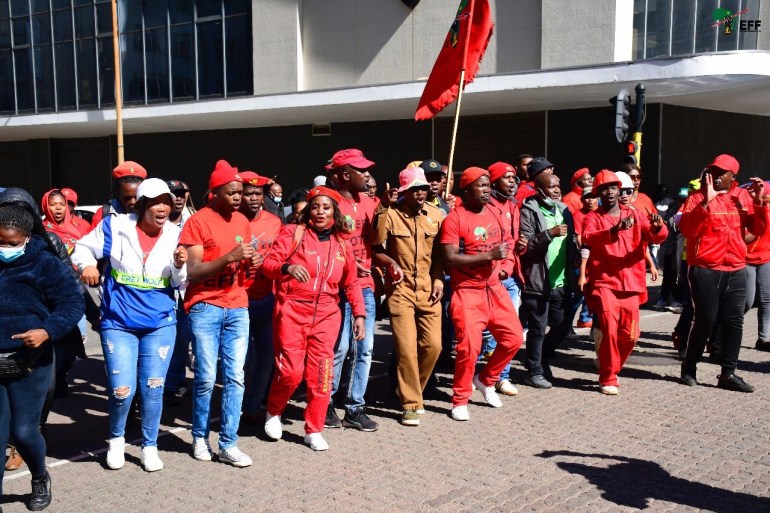Marikana victims rally in South Africa as Ramaphosa sued
EFF party rallied with families and survivors of the Marikana massacre in Johannesburg where lawsuit against President Ramaphosa was being heard.

Johannesburg, South Africa – The Economic Freedom Fighters (EFF), South Africa’s left-leaning and third-largest political party, rallied with the families and survivors of the Marikana mass shooting on Thursday at the South Gauteng High Court where a multimillion-dollar class-action lawsuit against President Cyril Ramaphosa was being heard.
On August 16, 2012, police in Marikana, in the North West province of South Africa, opened fire on hundreds of mine workers from Lonmin Platinum who were protesting for a basic wage of $800 per month, resulting in 44 deaths, more than 70 injuries and 250 arrests.
Keep reading
list of 3 itemsSouth Africa launches world’s biggest hydrogen-fuelled truck
South Africa’s opposition leader goes to Ukraine for fact-finding
The families and workers filed a lawsuit in 2015, which had remained stalled until recently, asking the court to hold Ramaphosa, who was a non-executive director of Lonmin Platinum at the time of the killings, personally liable for the deadly response of state law enforcement and compensation to the tune of $66m.
According to the EFF’s Head of Labour Desk Hlengiwe Mkhaliphi, the families are demoralised by the lack of progress in the case.
“Poor workers were massacred in Marikana and for 10 years there has been no justice,” Mkhaliphi said. “We want the president to answer for what happened.”

Ramaphosa, who was also a shareholder at the embattled Lonmin Platinum at the time of the mass shooting, has been accused by political opponents of using his position in government to influence the state police’s brutal response to the protest.
The Marikana Commission of Enquiry, established by the state in 2014 to investigate the shooting, would later look into leaked emails sent by Ramaphosa to other Lonmin Platinum shareholders and the minister of security, in which he referred to the protesters as “dastard criminals” and advised law enforcement to take “concomitant action”.
Although the commission cleared Ramaphosa, Andries Nkome, a lawyer in the team that represents the 329 applicants, alleged that the emails he sent set the wheels in motion for the deadly police response.
“Ramaphosa sent those emails – where he characterised what was really a labour dispute as a criminal act and called for ‘concomitant action’ – on the 15th of August … The next day at 4pm workers were mowed down. There is a direct link between the emails he sent and the killings,” he told Al Jazeera.
“This year marks 10 years since the Marikana massacre and the greatest legal progress we’ve made is that we will finally have our day in court,” Nkome added.
At the inquiry in 2014, Ramaphosa said his emails to the government were intended to prevent further loss of life, after at least nine people had been killed in the days prior to the mass shooting by police.
“The reference to ‘concomitant action’ in my email communication of 15 August 2012 was to indicate that appropriate steps should be taken to bring the violence and deaths to an end,” Ramaphosa testified. “I was calling for peace and for the necessary steps to be taken to save lives.”
Presidency spokesperson Vincent Magwenya did not respond to calls and messages for comment.

‘The capitalist rot’
Nondumiso Mngoma said her uncle was permanently disabled after being shot by a police officer with a bullet that penetrated his spine.
“My uncle is very depressed, he doesn’t do anything any more, he can’t even find work because how is he going to do it?”
Mngoma, like many others, is pessimistic about their chances of winning the civil action.
“He is the president, no judge will make an order that will embarrass the president no matter how wrong he is,” she told Al Jazeera. “They slaughtered our families like cows and no one has been arrested in 10 years. There’s no justice here.”
Mkhaliphi said the people of Marikana have lost faith in the justice system. “These poor workers are demoralised. They are feeling the extent of the capitalist rot under this democratic government.”
She added, “We, the EFF, will continue to support them and mobilise with them until justice is finally served for all the victims of the Marikana massacre.”
The civil case is continuing.